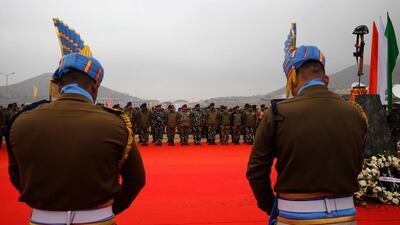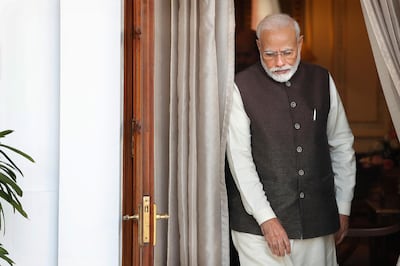One year after a deadly terrorist attack brought India and Pakistan on the brink of war, it is more important than ever for both countries to find peaceful solutions to their grievances. In doing so, they can offer much to the world and to one other.
Last February, 44 Indian soldiers lost their lives in Indian-administered Kashmir after a suicide bomber targeted their military convoy. It was one of the deadliest ever attacks on security forces there, for which New Delhi ascribed the blame to the territory’s other claimant, Pakistan.
The attack was the work of the Pakistan-based militant group Jaish-e-Mohammed, and has had lasting ramifications.
It triggered anger across India, putting pressure on the government to respond. A rare clash in the skies followed, with both nations losing airplanes. Moreover, India made incursions into Pakistani territory, altering the dynamics of the situation.
While both countries backed down shortly thereafter and restored calm, the turn of events later gave Prime Minister Narendra Modi the political impetus to revoke Kashmir’s autonomy and take full control of the territory. Since August, Kashmir been in lockdown. Unsurprisingly, this move angered Pakistan, with Prime Minister Imran Khan raising objections on the world stage, including at the UN General Assembly.
Today the situation in Kashmir remains in suspended animation and the India-Pakistan relationship frosty. However, with the ground beginning to shift beneath them, it is important that the two South Asian nations return to the negotiating table. Resolving some of their long-held differences, ranging from territory to terrorism, is in the interests of their mutual security and prosperity.
Recent months have seen new opportunities that render the prospect of a thaw in relations more likely. In November, India and Pakistan opened the Kartarpur Corridor – a road linking prominent Sikh shrines across the border – enabling Indian pilgrims to visit a gurdwara on the Pakistani side. Last month, India even announced it would invite Pakistan to the Shanghai Co-operation Organisation summit it will host this November. Meanwhile, New Delhi has gradually begun easing restrictions on the Kashmiri public.
It is also worth noting the steps Pakistan has taken, especially towards counterterrorism. Last week, authorities jailed Hafiz Saeed – the mastermind behind attacks in Mumbai in 2008 – albeit under American pressure and to assuage the concerns of the Financial Action Task Force, an international watchdog. Islamabad also deserves some credit for encouraging breakthroughs in negotiations between the US and Afghan Taliban militants, although the final structure of their deal – which will indicate how likely it is to bring peace to Afghanistan – is yet to be determined.
In short, since Mr Modi rose to power in 2014 and Mr Khan was elected four years later, there has never been a better moment for India and Pakistan to reset and talk to one another. Neither leader faces an election or a conceivable domestic challenge anytime soon; both have the political space necessary for good faith. The two countries have much in common, including shared history, a composite culture and geography. Surely, their futures are interlinked as well.
After 72 tumultuous post-independence years that have witnessed three wars and numerous flashpoints, bringing peace and prosperity to South Asia will be the best way for both countries to honour those who have fought to protect their borders – including the 44 soldiers in Pulwama.



